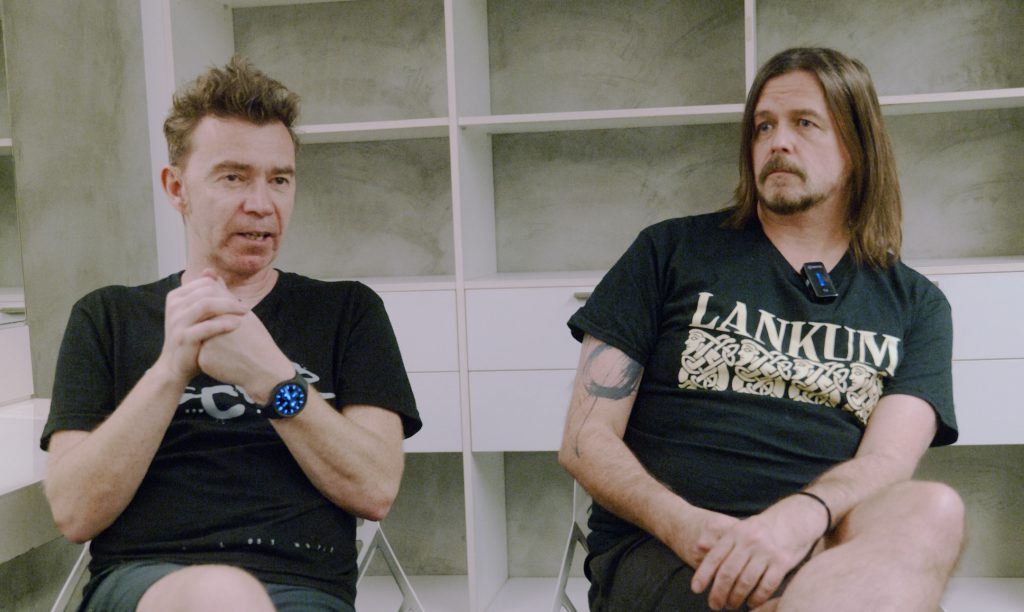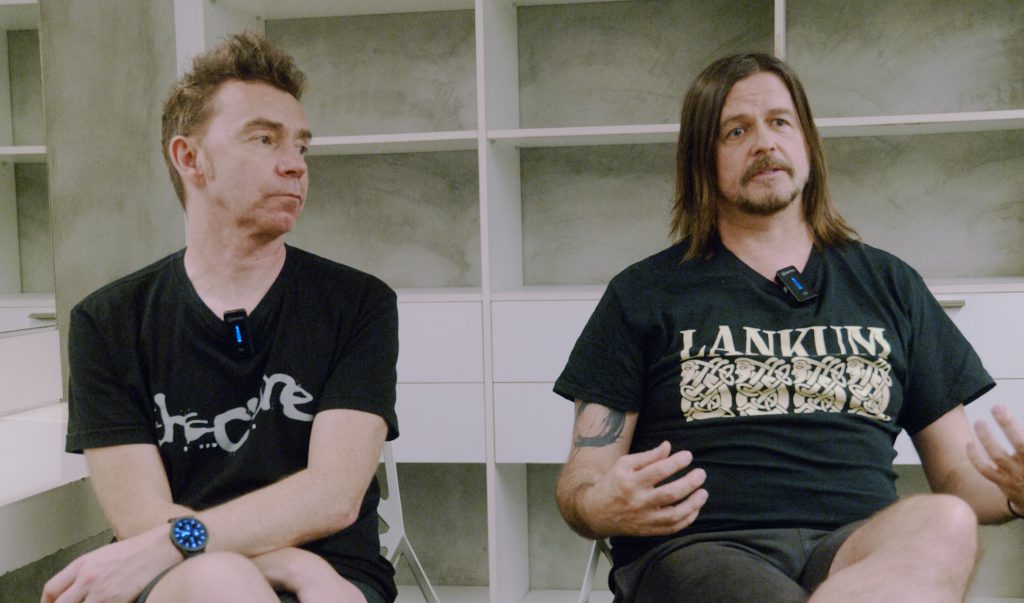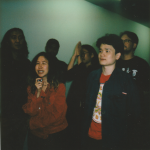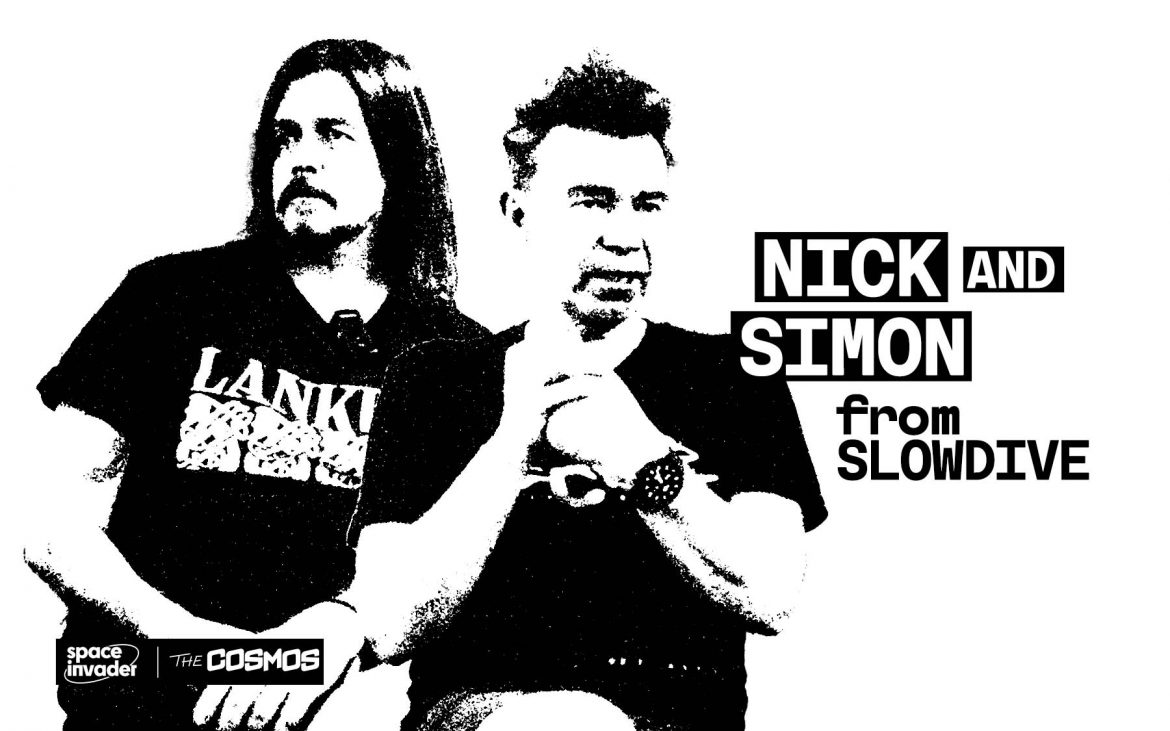Last time we had Christian Savill, the guitarist from Slowdive on their latest album ‘Everything is Alive’, but this time, it’s and honor to have Nick Chaplin (bass guitar) and Simon Scott (drums) who have just recovered from jet lag and now having white wine in paper cups (so cool) talking to us about the recording process and sharing younger bands wise words before the show in Bangkok that’s going to happen in few hours.

How do you feel about coming back and playing in Thailand the second time?
Nick: We’re always happy to play anywhere in the world and we’ve always have a really good time in Bangkok. But we’ve only have seen Bangkok, really, we haven’t seen any of the rest of Thailand at all. So this is our second time but I personally love the food, the atmosphere, the noise, also the chaos. And yeah it’s great, and the audiences here are wonderful so I’m looking forward to playing the show tonight.
Do you still remember in the past 6 years of the album making process, what is the best part of doing it?
Simon: We’re kinda stuck together in the Courtyard which is like our spiritual home we did ‘Just For a Day’, ‘Souvlaki’, ‘Pygmalion,’ the self-titled album, and we did a lot of this album there. And that, for me, was the really nice part where Neil (Neil Halstead, vocal and guitar) would come with the… and we listened to the demo ‘Oh, that would be a good tune.’, then we work on it as a band, and we thrashed out the rhythm side of things, and then Neil would take that to his home studio in Cornwall, and bring it back here, and Christian wrote through a lot layers, and all of us we record in that part… that happened quite a lot. But it was really nice to go to the Courtyard studio which is in the village called Sutton Courtenay in Oxford. It’s kinda our second home.
Nick: I think we had a fun time at the other place too Chapel Studios. So we went to the new studio where for once it was residential so we can actually live there, and we had the partner of the owner of the studio cooking food for us everyday and we never had that before. We normally kind of some of us visited the studio and some of us leaved, but we were kinda stuck together all 5 of us and we couldn’t leave. There was nothing around there, you know, so we had to stay. That was kind of fun I thought, it was like I’d like to do more of that cus it forces you to kind of like to be a bit more of a unit I think. You can’t just be like ‘Oh, I’ve just got to pop home.’ you just gotta stay there. That was good so I enjoyed that.
Does it make you feel like when you were together as a band 30 years ago?
Nick: Recording wise, well, we kinda did when we were younger because we would sleep on the floor, and sleep on the couch and stuff. Now that we’re older, you know, we’re a bit more of an endeavor. We would like to have comfortable bedrooms and ensuites and sort of masscouch everyday and all that kind of stuff. So yeah, we used to kind of live together in the studio when we were like 20-21 years old, but since 2014 we got back together we haven’t done that until this one period of time.
During the recording, which song is the most difficult to finish?
Nick: We finished everything really quickly because we were really good.
Simon: Good answer, I like it though. The mixing took a long time. I think Neil attempted to mix everything but he was way too close to it and he got very much like ‘this is mine’, and in the end we got a guy Shawn Everett from Los Angeles to mix it. That process of Neil’s very hands on and he gets fiercely kind of like passionate and protective about Slowdive and he wanted to mix it, so that process of sort of let that Neil mix it.. well, they’re great songs, he’s a great musician, but let’s try to get a fresh POV is took a while to me, and to wait for Shawn to be like finish with The Killers, Interpol, War On Drugs, Kanye, you know, we were like, ‘Well, okay, we’ll wait,’ and that process of getting it actually over the line of finish the mix that was the kind of…
Nick: Yeah, and I think there are a couple of songs like ‘shanty’ and ‘chained to a cloud’. Those songs were the earliest ones from the session. They came very early. But particularly ‘chained to a cloud’ went through so many changes and it was one of the last ones to be finished, but it has no relations to the song that actually started. So yeah, they were a couple of songs that took a long time, and then other ones like ‘prayer remembered’ was very fast and wrote out very quickly. But it’s always the same isn’t it? Every record has always a couple of changes that take forever to come together.
Simon: Yes, ‘Slomo’ was the last one, yadda yadda
Then performing wise? When you changed to become a synth oriented, does that make anything challenging?
Nick: I think we’ve added some keyboards and some samples but I wouldn’t say we’ve changed. I think we primarily were the guitar band live.
Simon: Definitely. Yeah I think everyone uses synthesizers so I think a lot has been made of like ‘Slowdive gone modular’ you know it’s just the more kind of profit on the album, that’s what really is and a lot has been made of this.. ‘Slowdive had gone electronic’ there’s always been technology. There’s always been loops and drum machines and stuff, I mean ‘Souvlaki’ was like that and obviously ‘Pygmalion’ is even further more kind of electronic, but yeah, I think Slowdive was a guitar band. Then if you heard a couple of synths it doesn’t lead to Depeche Mode.
Nick: Unfortunately. But we have one sample on track in one song and that’s literally it. So we definitely… (Simon: One snare drums..) and that’s it. And we could be more sort of sample-y, electronic-y I supposed, but right now we want every song to exactly like it does on the album then we could use loops and samples and you can trigger them from your machine on, you know. But we’ve always quite different live to recorded like even back in the 90s, we were much more energetic live. People would come and say to us like ‘Wow, I thought you were gonna be really kinda quiet and boring but actually you’re quite interesting.’ Hopefully we’re still interesting.
You are! Honestly I see younger and younger fans listening to Slowdive and they would never think you’re the band from the 90s or they may even think you’re their age!
Nick: It is strange because there’s obviously a bunch of kids down the front knew you, and they’ve come to the band through some hits which they discovered through TikTok and other social media platforms. We don’t play ‘When the Sun Hits’ until the quiet nearly end of the set, and I wonder what they make of the hour before it. It’s like ‘Do they like this?’ Do they think ‘Why did we buy the ticket for this? This is weird.’ But they seem into it.
Simon: We kinda have a bit of trivia for you. Tomorrow night when we play in Singapore we’ve got the youngest type of fan coming. She’s 11 years old. She’s a niece of a friend I went to school with and she’s allowed to go to the concert. She loves Slowdive. She’s 11. So the fanbase keeps on getting younger, we keep getting older. So I don’t know how that’s gonna go.
Nick: I know, it’s gonna be like The Rolling Stones.
Have you thought of the new album yet?
Simon: It’s way too early. I mean because of Covid and it was like, recording session ‘Oh shit this is canceled. Okay, we got another one booked… ahhh we can only do a week of that 2 weeks.’. That kind of turned it into 3 years, which is usual for us to make an album.
Nick: We’re not quick. We’ve never been quick.
Simon: Yeah, we don’t write on the road. Where is more… We suddenly got this big back catalog that expands to a couple of years. It’s like ‘Let’s try that one from that EP that wasn’t released in 1991.’ and we’re busy working on those rather than writing new songs. That’s not really how the process should be.
Nick: No. It will be a break after this album campaign is over. And everybody will go back to their sort of other lives. And at some point Neil will be like ‘hmm, should we do another record?’ And who knows when that will be. So, enjoy it while you can.

Lots of new bands make music that sounds like Slowdive or their other heroes like My Bloody Valentines or Lush. Could you give advice for these kids to find their own sound?
Simon: What you just said. Find your original sound by not copying us or My Bloody Valentines or Cocteau Twins. But there’re some… we really actively seek out support bands for our tours and we’ve been really lucky, and we have Deary who’s this band from London who’re amazing. And you can hear Slowdive and Cocteau Twins, but you can hear Saint Etienne and Massive Attack and they doing their own thing. I think that’s the key. Little music fans think most of us are right and of course you have your influences, but you have to kind of like to expand and evolve it so it becomes something unique, otherwise, it’s been done already and nobody would want to hear it.
Nick: It takes time doesn’t it? I think if you’re a new band initially, you’ll probably sound a lot like your influences. But as you get experience and hear new stuff and get used to playing and recording, your own kind of print gets put on it.
Why did you pick Telever to be your supporting act?
Even subconsciously, for the opening act we do try to pick younger bands who maybe we need a little leg up, but also have a little bit of connection to us musically and for this album campaign works really well. We have Whitelands who are a new band. They are very young, signed to Sonic Cathedral who’re a label who we’re very close to (Simon: They’re college kids.) and Pale Blue Eyes who’re a little bit older but again, still much younger than us. Most bands are younger than us. And where we’ve had opening acts on this run in Asia, we’ve been given our selection and we picked them based on.. we look into their Spotify, we look at who they are, what kind of music and whoever seems the most suitable appear to us so we like them.
Simon: They give us a bit of a leg up not that we’re like sort of a great white savior to young shoegaze bands or anything, but hopefully people don’t see us like that, but its a chance for young bands who play really small shows to play in front of big audience and we did too. (Nick: And we benefited from it in the 90s.) Such a steep learning curve when you suddenly got an hour, okay half of the set sounds like the Smashing Pumpkins but this a bit sounds really weird. Let’s explore a wee bit how… you know you develop during all those little things so it’s nice for us to pay back to them that they listened to our music basically.
Nick: I think I can’t quite remember but it was quite a long time ago. But what normally happens is we all get sent a list from the promoters generally unless there’s one of us who maybe has a contact of their own in the city or in the country. But for Thailand, in this case, we were sent 4 different acts. I think we all sort of liked them and most of us were more interested in Telever, is this how it’s pronounced? Just like the sound, really, and read a little bit of who they were.. I don’t remember specifically because we had a lot of bands to go through for the tour. It’s not that we always agree. We don’t know like ‘Oh, 5 of us like ‘yes’’ but that was enough interest that we all like them and so it seems like a good choice.
Read more
Slowdive on ‘Everything Is Alive’ and the Upcoming Bangkok Show

อิ๊ก นักเขียนสายดนตรีที่เกือบจะต้องวางมือ แต่คงหนีไม่พ้นเพราะยังอยากพูดถึงวงและเพลงดี ๆ ต่อไปเรื่อย ๆ

